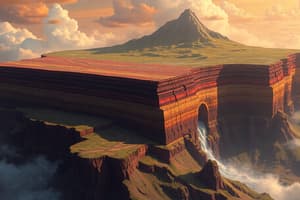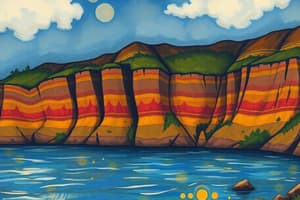Podcast
Questions and Answers
What causes the movement of tectonic plates?
What causes the movement of tectonic plates?
- Convection currents in the mantle (correct)
- Gravitational pull from the core
- Cooling of the Earth's crust
- Pressure from sediment layers
Which type of rock is formed primarily by heat or cooled magma?
Which type of rock is formed primarily by heat or cooled magma?
- Metamorphic rock
- Igneous rock (correct)
- Sedimentary rock
- Fossilized rock
What type of boundary occurs when two tectonic plates slide against each other?
What type of boundary occurs when two tectonic plates slide against each other?
- Divergent boundary
- Transform boundary (correct)
- Subductive boundary
- Convergent boundary
What is the law of superposition used for?
What is the law of superposition used for?
Which process refers to the breaking down of rocks into smaller pieces?
Which process refers to the breaking down of rocks into smaller pieces?
What is a significant human impact on the environment that leads to soil degradation?
What is a significant human impact on the environment that leads to soil degradation?
Which of the following occurs when tectonic plates move away from each other?
Which of the following occurs when tectonic plates move away from each other?
What does the amplitude of a wave measure?
What does the amplitude of a wave measure?
Flashcards
Layers of Earth
Layers of Earth
Different zones within Earth, becoming denser going in.
Convection Currents
Convection Currents
Heat rising, cooling and falling in Earth's mantle, causing plate movement.
Types of Rocks
Types of Rocks
Igneous (heat), Sedimentary (layers), and Metamorphic (pressure).
Law of Superposition
Law of Superposition
Signup and view all the flashcards
Plate Boundaries
Plate Boundaries
Signup and view all the flashcards
Weathering
Weathering
Signup and view all the flashcards
Human Impact (Soil Erosion)
Human Impact (Soil Erosion)
Signup and view all the flashcards
Electromagnetic Waves
Electromagnetic Waves
Signup and view all the flashcards
Study Notes
Earth's Layers and Rock Recycling
- Earth's layers (mantle, core) become denser inwards
- Tectonic plates move due to mantle convection currents
- Three rock types: metamorphic (pressure), sedimentary (layers), igneous (cooled magma)
- Law of superposition: younger rocks are on top of older rocks
Weathering, Erosion, and Deposition
- Weathering: breaking down rocks (chemical or physical)
- Erosion: moving rocks/sediment (various sources)
- Deposition: sediment settling in new location
Plate Tectonics
- Plate tectonics: plates moving over time
- Evidence: fossil records, etc.
- Types of plate boundaries:
- Transform: plates slide past each other (earthquakes)
- Convergent: plates collide (mountains, volcanoes)
- Divergent: plates move apart (sea trenches)
- Rocks created at divergent boundaries are usually igneous.
Law of Superposition
- Younger rocks are on top of older rocks in sedimentary layers
- Used for relative dating: comparing rock ages
Human Impact
- Greenhouse effect: gases trapping heat
- Urbanization: habitat destruction
- Soil erosion: reduced fertility
- Desertification: fertile land turning to desert
- Ocean acidification: increasing acidity of oceans
Electromagnetic Waves
- Electromagnetic waves have both wavelength and amplitude
- Light waves speed: Vacuum > Air > Liquid > Solid
- Sound waves speed: Solid > Liquid > Air
- Electromagnetic spectrum: Radio, Microwave, Infrared, Visible, UV, X-ray, Gamma
- Different colors/waves reflect and refract differently
- A color reflects a certain wavelength
Energy
- Energy is the ability to do work.
- It can't be created or destroyed.
- Types of energy: potential (stored) and kinetic (moving)
Heat
- Heat is the transfer of thermal energy from hot to cold
- Temperature is a measure of the average kinetic energy
- Heat transfer until thermal equilibrium is reached (equal heat)
Studying That Suits You
Use AI to generate personalized quizzes and flashcards to suit your learning preferences.




